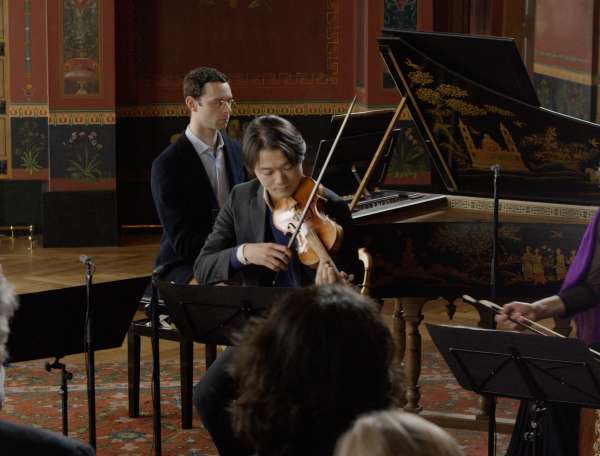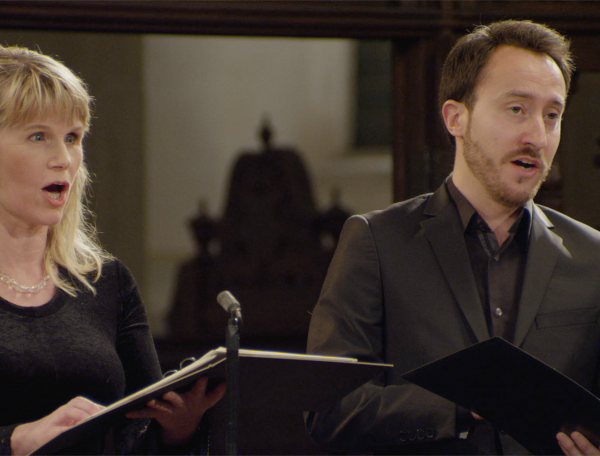

Orchestral Suite No. 2 in B minor
BWV 1067 performed by the Netherlands Bach Society
conducted by Shunske Sato
TivoliVredenburg, Utrecht
Behind the music
Journey through time
A mouth-watering cross-section of the European Baroque for a virtuoso flautist
From the pompous opening bars all the way through to the frivolous finale, Bach’s suite no. 2 is a mouth-watering piece of music. And that applies literally to the flautist, who has to keep proving his worth with no respite whatsoever. Preceded by an overture of typically slow dotted figures, the series of court dances – rondeau, sarabande, bourrée, polonaise and minuet – appear thoroughly imbued with French ‘esprit’. However, the brilliant flute part marks the piece as no less than an extravagant Italian solo concerto, beneath which Bach has built a solid German foundation.
The work is also a journey through time, opening in seventeenth-century Lully style and closing with the extremely galant final section. It is questionable whether Bach actually intended this bantering ‘Badinerie’ to make fun of the preceding music. But one thing is certain – the flautist (most probably the French virtuoso Pierre-Gabriel Buffardin) must have had splendid fun with it. After all, the famous flautist Johann Joachim Quantz, who was briefly a pupil of Buffardin, had said rather maliciously that his master played only fast pieces, as he excelled in them.
Orchestral Suites, BWV 1066-1069
Although it is tempting to talk of the Four Orchestral Suites, it could well be the case that Bach wrote another one or two, or even ten of them. Because unlike the ‘Brandenburg’ Concertos, these Four Orchestral Suites are not related to one another. Specialists like Joshua Rifkin even regard them as arrangements of pieces from other genres. Bach simply wrote presentable festive music for the wealthy courts of Weimar and Cöthen; occasional music that later found a new home in the repertoire of the Collegium Musicum.
Bach’s Suites (series of stylised dances) exude the style and atmosphere of the dance music written by Lully at the court of Louis the Fourteenth. Nowadays, we call this a suite, but at the time it was known as an Overture, or opening piece. As a tribute to the king, such a succession of dances began with a stately opening that had a remarkably staccato rhythm – to which the king could make his entrance – followed by a somewhat faster, fugal middle section.
One interesting hypothesis about the relative dearth of suites by Bach is that he could not master the genre sufficiently. The model came directly from the Paris of Lully and would brook no competition. Particularly the pompous overture – with its slow-quick-slow, fugal middle section and ‘French’ rhythms – is typical… and maybe too restrictive for our young German Kapellmeister.
Extra videos
Vocal texts
Original
Translation
Credits
-
- Release date
- 27 November 2015
-
- Recording date
- 30 November 2014
-
- Location
- TivoliVredenburg, Utrecht
-
- Violin and direction
- Shunske Sato
-
- Violin 1
- Annabelle Ferdinand, Lucia Giraudo
-
- Violin 2
- Anneke van Haaften, Paulien Kostense, Hanneke Wierenga
-
- Viola
- Bernadette Verhagen, Jan Willem Vis, Femke Huizinga
-
- Cello
- Lucia Swarts, Barbara Kernig
-
- Double bass
- Joshua Cheatham
-
- Traverso
- Marten Root
-
- Harpsichord
- Siebe Henstra
-
- Concert production
- Marco Meijdam, Imke Deters
-
- Producer
- Zoë de Wilde, Frank van der Weij
-
- Film director
- Lucas van Woerkum
-
- Director of photography
- Sal Kroonenberg
-
- Camera
- Ruben van den Broeke, Diderik Evers, Sal Kroonenberg
-
- Music recording producer
- Leo de Klerk
-
- Gaffer
- Victor Jas
-
- Film editors
- Lucas van Woerkum, Frank van der Weij
-
- Score reader
- Stijn Berkouwer
-
- Music recording assistants
- Gilius Kreiken, Jaap van Stenis, Bobby Verbakel, Jaap Firet
-
- Camera assistant
- Izak de Dreu, Indy Hamid
-
- Music edit and mix
- Leo de Klerk, Frank van der Weij
-
- Music edit and mix asssistant
- Martijn Snoeren
-
- Colorist
- Rachel Stone
-
- Interviews
- Onno van Ameijde
-
- Acknowledgements
- Bert Begeman

